As Zelensky Commits to Meeting Putin Face-to-Face, the Kremlin Hesitates While Russian Forces Advance on Multiple Fronts and Western Leaders Prepare Punishing Sanctions Package
Summary of the Day – May 13, 2025
With less than 48 hours until the proposed peace talks in Istanbul, the diplomatic chess match intensified as President Volodymyr Zelensky threw down the gauntlet, confirming his willingness to meet Vladimir Putin in person while the Kremlin remained strategically ambiguous about Putin’s attendance. Presidential Office chief Andriy Yermak declared Putin’s absence would be “the final signal that Russia does not want to end this war,” even as Russian forces continued offensive operations across the battlefront, advancing near Lyman, Toretsk, Pokrovsk, and Velyka Novosilka. Meanwhile, European leaders threatened “significant tightening of sanctions” if Moscow fails to negotiate in good faith, with French President Emmanuel Macron even suggesting the possibility of placing French nuclear weapons on the territory of Eastern European allies to deter Russian aggression.
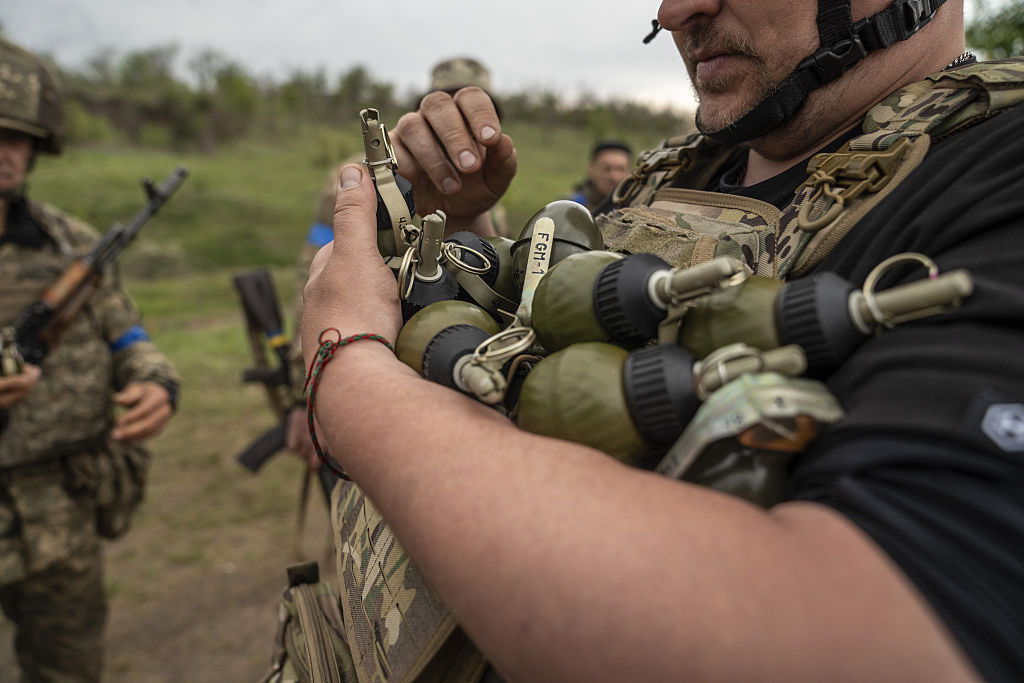
Ukrainian infantrymen from the 68th brigade undergo training on tactical combat medicine in Donetsk Oblast. (Jose Colon/Anadolu via Getty Images)
The Istanbul Challenge: Zelensky Waits for Putin’s Move
In a calculated diplomatic maneuver, President Zelensky announced he would travel to Ankara to meet Turkish President Recep Tayyip Erdogan, but made clear both leaders stand ready to fly immediately to Istanbul if Putin confirms his participation in the peace talks. “We will be waiting to meet with Putin in Turkey. So that Russia does not manipulate cities and say that Putin is not ready to fly to Ankara, but is ready to fly only to Istanbul,” Zelensky told reporters in Kyiv, effectively eliminating any potential Russian excuses about location.
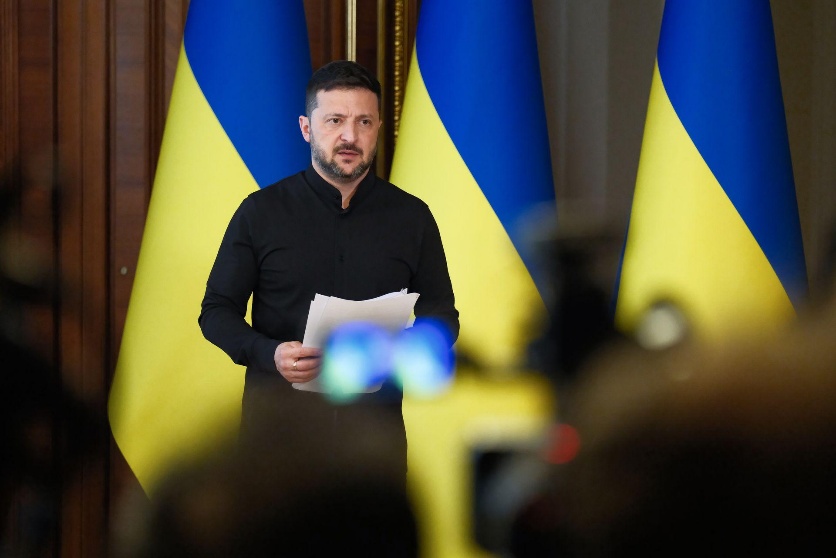
President Volodymyr Zelensky speaks during a press conference on the negotiations in Istanbul, in Kyiv, Ukraine. (Vitalii Nosach / Global Images Ukraine via Getty Images)
The Ukrainian leader’s challenge follows Putin’s proposal for direct talks after rejecting a 30-day unconditional ceasefire demanded by Ukraine and its Western allies. Kremlin spokesperson Dmitry Peskov confirmed a Russian delegation would attend the talks but remained noncommittal about Putin’s personal participation, saying Russia would announce its representative only when Putin “deems it necessary.”
“If Vladimir Putin refuses to come to Turkey, it will be the final signal that Russia does not want to end this war, that Russia is not willing and not ready for any negotiations,” Presidential Office chief Andriy Yermak warned, raising the diplomatic stakes even higher.
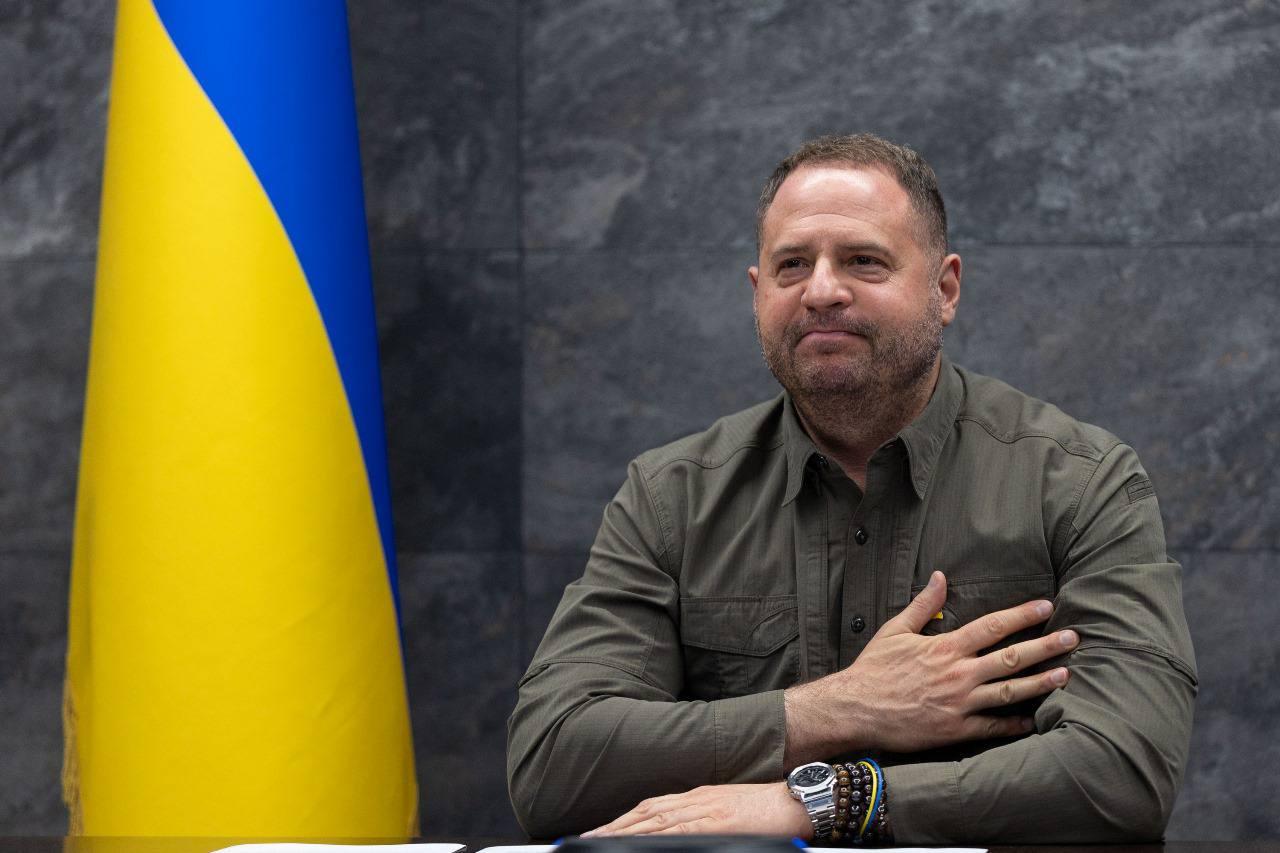
Presidential Office chief Andriy Yermak duing an online adress to the the Copenhagen Democracy Summit in Denmark. (Andriy Yermak/Telegram)
The European Union’s top diplomat Kaja Kallas expressed her own skepticism about Putin’s willingness to engage directly: “I think it’s a good move if they sit down,” she told a democracy conference in Copenhagen, adding bluntly, “But I don’t think he dares, Putin.”
America’s Diplomatic Cavalry: Trump Administration Saddles Up for Istanbul
U.S. President Donald Trump injected American diplomatic muscle into the potential peace talks, confirming that Secretary of State Marco Rubio and other senior officials would attend. “Our people are going to be going there. Marco is going to be going there. Others are going to be going, and we’ll see if we can get it done,” Trump declared during the U.S.-Saudi Investment Forum.
Trump’s special envoys, Steve Witkoff and Keith Kellogg, will join the U.S. delegation to observe the negotiations. Kellogg, speaking to Fox Business, painted an optimistic picture: “We can get peace — and I really believe it could happen quickly if all three leaders sit down and talk. President Trump has the art of the deal. He knows how to make it work.”
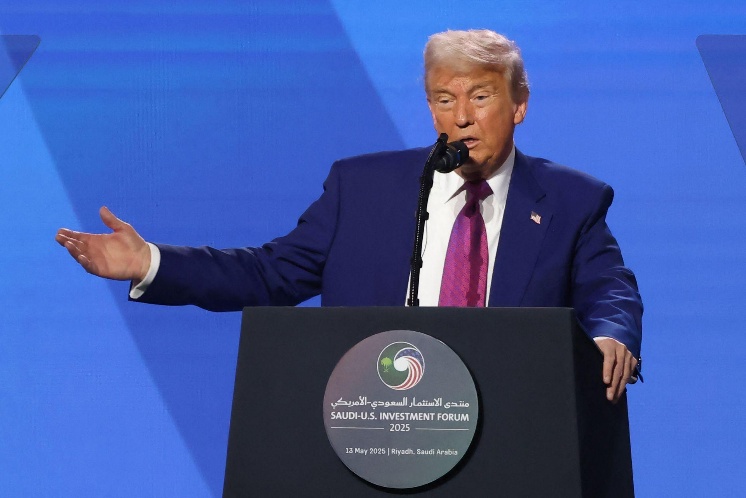
US President Donald Trump speaks during the Saudi-US investment forum at the King Abdul Aziz International Conference Center in Riyadh. (Fayez Nureldine / AFP via Getty Images)
A senior administration official revealed to CNN that Trump’s own attendance would largely depend on whether Putin shows up, creating additional pressure on the Russian leader. Zelensky welcomed the possibility of Trump’s participation, noting it would provide “additional impetus for Putin to come.”
The Economic Arsenal: Europe and U.S. Prepare Financial Weapons
European leaders unveiled their economic leverage against Russia, threatening severe consequences if Moscow fails to engage constructively in peace efforts. German Chancellor Friedrich Merz minced no words: “We agree that if there is no real progress this week, we will then work together at the European level for a significant tightening of sanctions.”
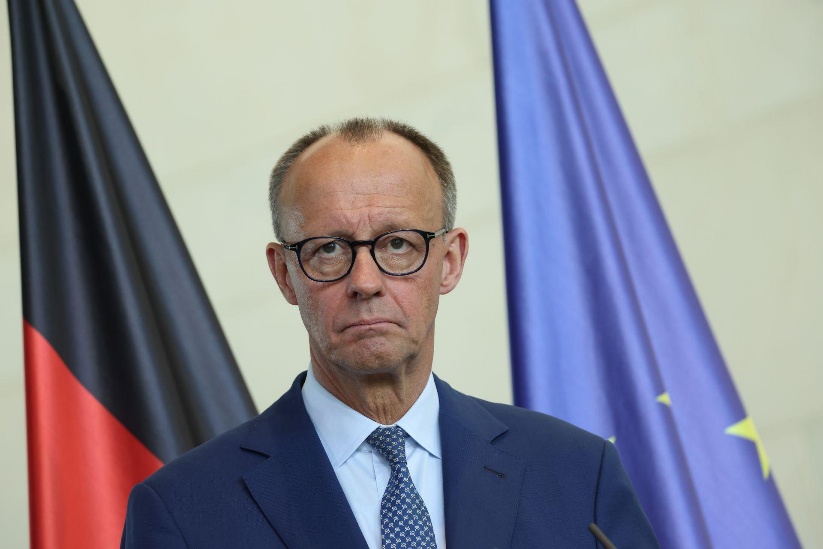
German Chancellor Friedrich Merz and Greek Prime Minister Kyriakos Mitsotakis speak to the media following talks at the Chancellery, in Berlin, Germany. (Sean Gallup/Getty Images)
French President Emmanuel Macron echoed this stance during an interview with French broadcaster TF1, confirming that the European Commission is preparing new sanctions “in the coming days” targeting Russian financial services and oil and gas sectors. “The goal is a ceasefire on land, in the air and at sea… and to discuss the issue of territories and security guarantees,” Macron stated.
In a dramatic escalation of deterrence rhetoric, Macron revealed France’s openness to placing its nuclear weapons on the territory of other European countries as a check against Russian aggression, saying he was “ready to open a discussion” with allied European countries about such deployments.
In Washington, U.S. Special Envoy for Ukraine Keith Kellogg warned that the “Russian Sanctions Act of 2025 is ready to go,” with at least 72 senators supporting legislation that includes sweeping financial penalties and 500% tariffs on countries that continue buying Russian oil, gas, or uranium. “And we’ve alerted President Putin to that — these sanctions are very serious,” Kellogg added.
Battlefield Chess: Russian Forces Advance as Ukraine Strikes Key Air Defense
Even as diplomatic maneuvering accelerated, Russian forces continued their grinding advance along multiple sections of the front line. Geolocated footage confirmed Russian gains in eastern Ridkodub north of Lyman, northwest and southwest of Toretsk, in central Myrne east of Pokrovsk, and near Novosilka southwest of Velyka Novosilka.
Ukraine’s Khortytsia Group of Forces reported that Russian forces conducted several assaults using motorcycles and other light vehicles for the first time in the Lyman direction. Near Vasyukivka, Russian forces launched a motorized assault on six motorcycles, a tactic that appears to be spreading across different sectors of the front.
But Ukraine scored its own tactical victories. Ukrainian Special Operations Forces’ attack drones destroyed a Russian Buk-M3 anti-aircraft missile system and a Uragan-1 multiple launch rocket system, the military branch reported. The Buk-M3 system alone was valued at approximately $45 million. This successful strike demonstrated Ukraine’s continuing ability to neutralize expensive Russian military hardware using its growing drone capabilities.
Meanwhile, Russian attacks against Ukrainian civilians persisted across multiple regions, killing at least two people and injuring seven more. In Donetsk Oblast, one person was killed in the village of Zoria, while in Sumy Oblast, a Russian drone struck a car carrying energy specialists, killing the driver. Attacks in Kherson, Kharkiv, and Zaporizhzhia oblasts wounded several others, including a child.
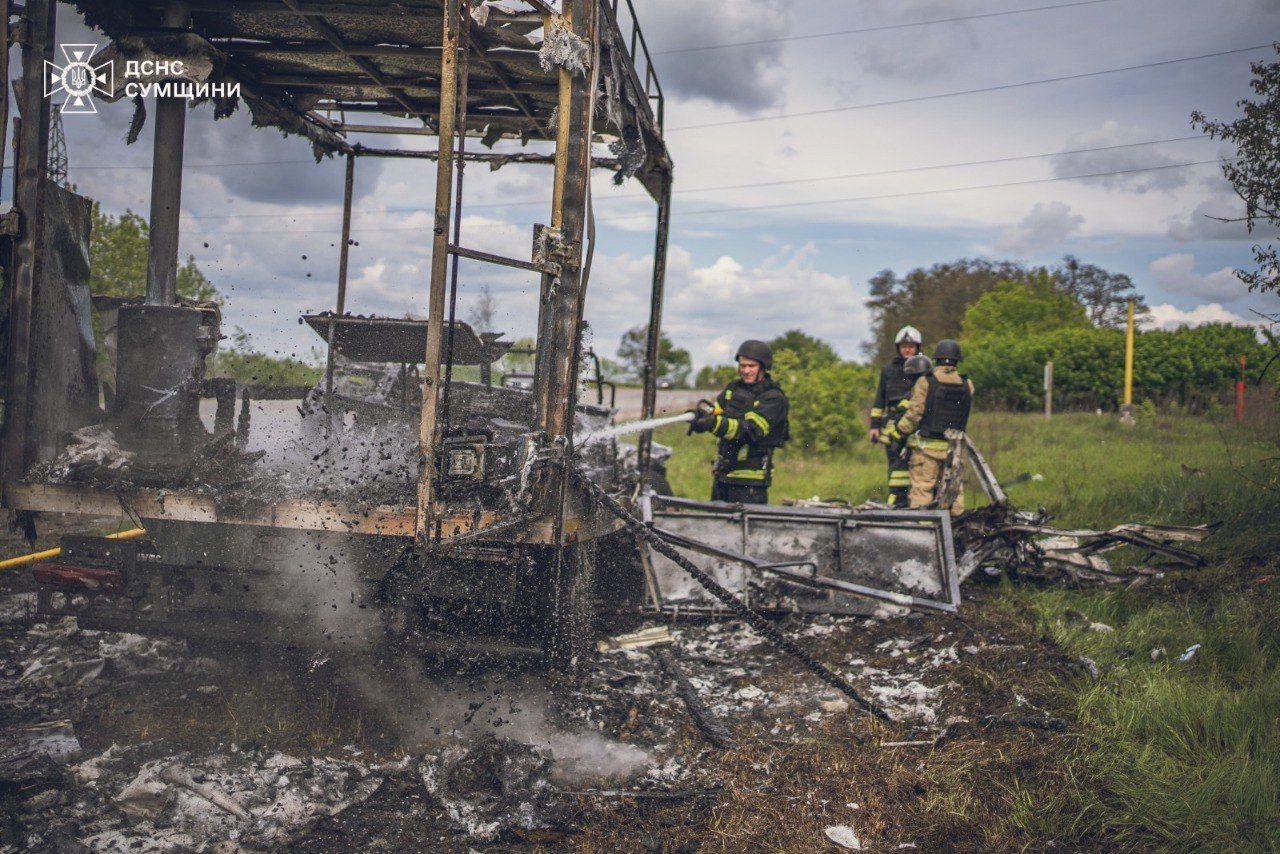
A vehicle of energy workrers destroyed in a Russian drone attack on Sumy Oblast, Ukraine. (State Emergency Service/Telegram)
The Motorcycle Legion: Russia’s Tactical Evolution Takes Shape
The Russian military appears to be formalizing a tactical doctrine and force structure for motorcycle and light vehicle units, marking a significant adaptation to the drone-dominated battlefield in Ukraine.
Ukrainian military observer Kostyantyn Mashovets revealed that Russia is working to equip every battalion with up to 30 motorcycles, 20 ATVs, and six buggies, with each platoon receiving up to nine motorcycles. “Storm V” penal recruit assault companies would be outfitted with up to 15 motorcycles each.
Mashovets noted that the Russian 3rd Combined Arms Army had amassed an impressive fleet of up to 1,125 motorcycles, 975 ATVs, and 210-215 buggies by early May. The sudden proliferation of these vehicles represents Russia’s response to Ukrainian drone innovations and an attempt to offset significant armored vehicle losses sustained earlier in the conflict.
“Russian units currently prefer to use motorcycles in tandem with infantry and armored vehicles,” Mashovets explained, though he suggested Russian forces may soon begin conducting assaults exclusively with motorcycles, signaling a potentially significant evolution in modern ground warfare tactics.
The Replacement Army: Putin Claims 50,000-60,000 Monthly Volunteers
Russian President Vladimir Putin announced on May 13 that between 50,000 and 60,000 people voluntarily join the Russian military each month, a staggering figure that suggests Russia may be generating enough forces to replace its heavy battlefield losses while simultaneously expanding its overall force presence in Ukraine.
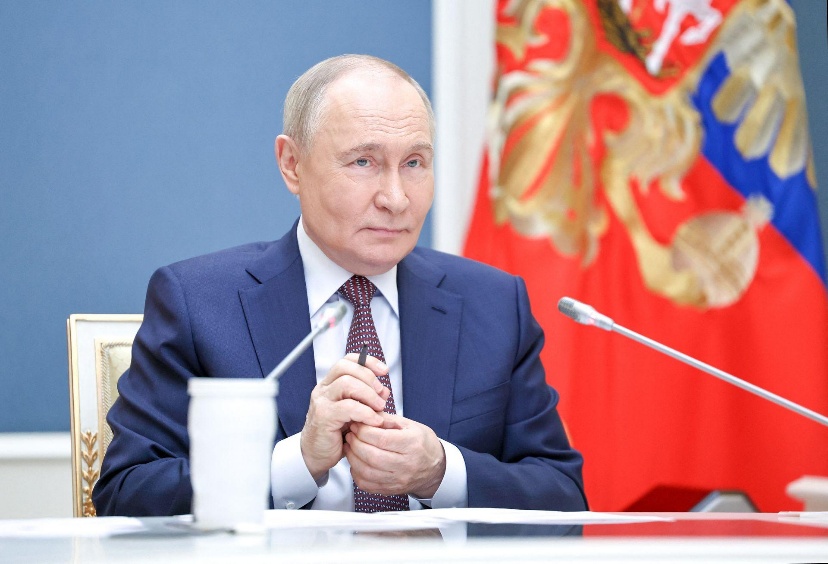
Russian President Vladimir Putin holds a videoconference meeting with members of the all-Russian public organization “Delovaya Rossiya”, a union of entrepreneurs, in Moscow (Alexander Kazakov / Pool / AFP)
The claim came as Ukrainian Commander-in-Chief General Oleksandr Syrskyi revealed that Russian forces had suffered 177,000 casualties in Ukraine since the start of 2025 alone—a rate of loss that would have crippled most armies. Yet despite these losses, Syrskyi reported that the Russian force grouping in Ukraine had increased from about 603,000 on January 1 to 623,000 just over three months later.
This paradoxical growth amid catastrophic casualties appears possible because Russian recruits reportedly receive only a month of training before being deployed to Ukraine. These poorly-trained soldiers are then sent into highly-attritional infantry assaults to secure small territorial gains at enormous human cost.
Military analysts suggest this approach is designed to pressure Ukraine and the West into concessions during negotiations, even as Putin appears
Diplomatic Decree Drama: Zelensky Clarifies Negotiation Authority
Ukrainian officials moved to dismantle a key Russian talking point, clarifying that a September 2022 presidential decree does not prevent Zelensky from negotiating directly with Putin.
Zelensky explained to journalists that Russian officials have been misrepresenting the decree, which was intended to prevent other Ukrainian officials—not Zelensky himself—from negotiating with Putin. The decree does not restrict Zelensky from exercising his “[constitutional] rights and duties” as Ukraine’s head negotiator.
Chairperson of Ukraine’s Verkhovna Rada Foreign Affairs Committee Oleksandr Merezhko reinforced this interpretation, telling Ukrainian English-language news outlet Kyiv Independent that Ukraine’s Constitution “clearly” specifies Zelensky as Ukraine’s chief negotiator and noting that Zelensky’s constitutional powers allow him to override past decrees.
This clarification removes a frequently cited Russian “obstacle” to negotiations and places the responsibility for engaging in good-faith talks squarely on the Kremlin.
The Nuclear Plant Spy: Former Employee Arrested for Aiding Russia
Ukraine’s Security Service (SBU) announced the arrest of a former employee of the Rivne Nuclear Power Plant on suspicion of working with Russian military intelligence (GRU) to target drone strikes on the facility’s power lines.
According to the SBU, the man was recruited to assist with strikes on high-voltage power lines connecting the Rivne NPP in Rivne Oblast with Kyiv Oblast power facilities, which supply electricity to the capital and surrounding areas.
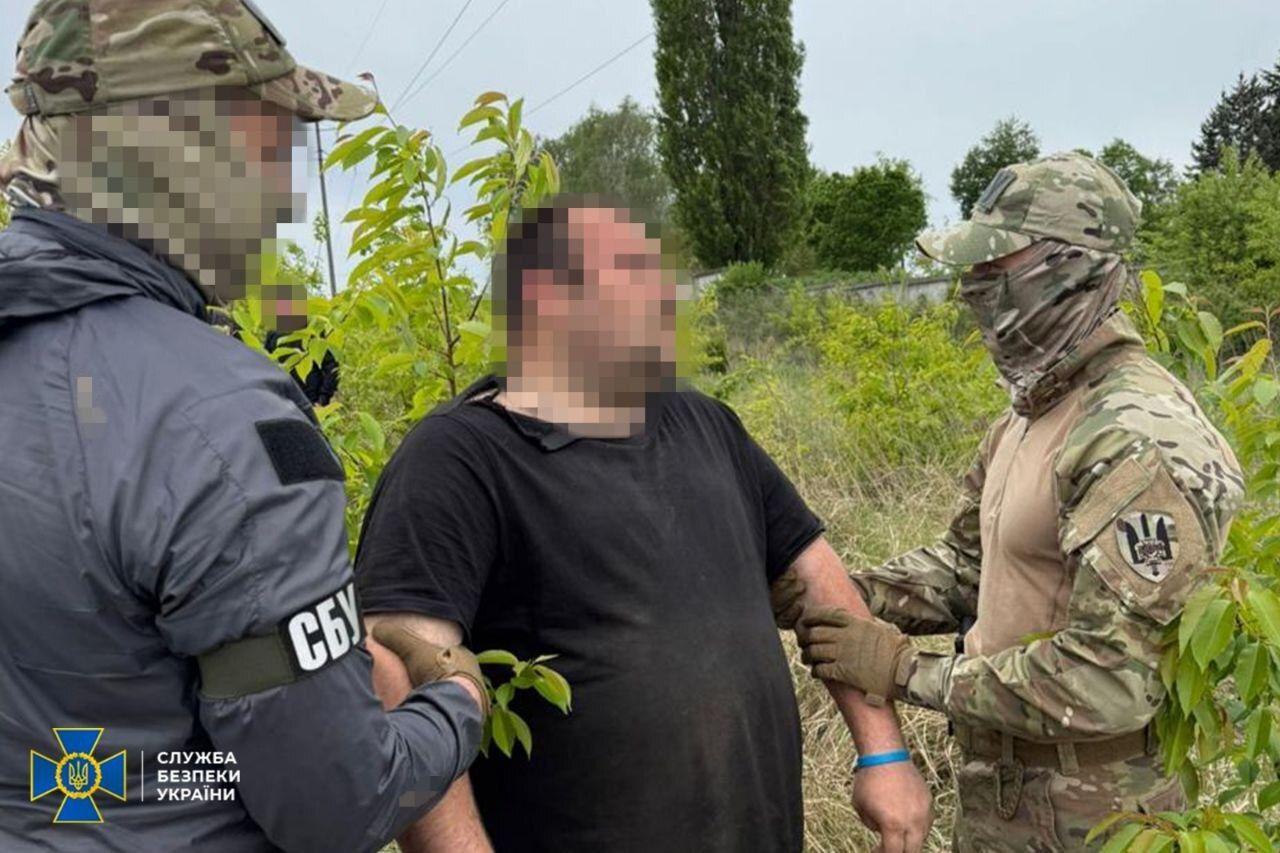
A picture released of the suspect being arrested (Security Service of Ukraine)
The suspect, who had quit his job at the nuclear plant before the full-scale war began, was reportedly contacted by a GRU liaison in spring 2025 and offered money in exchange for his cooperation. He was detained while attempting to activate a GPS tracking module on one of the main power line’s poles.
Authorities seized the suspect’s mobile phone, which reportedly contained incriminating messages exchanged with Russian security services. If convicted of sabotage committed under martial law, he faces life imprisonment and property confiscation.
The Mineral Future: U.S.-Ukraine Reconstruction Fund Launches
Ukraine and the United States formalized their economic partnership on May 13, signing two additional agreements to launch a joint Reconstruction Investment Fund as part of the deal for Ukraine’s mineral resources. The Ukrainian parliament simultaneously approved in the first reading changes to the budget code necessary for the fund to operate.
The documents establishing the fund were signed between Ukraine’s Public-Private Partnerships Agency and the U.S. International Development Finance Corporation, a key agency of the U.S. government for foreign investment.
“We have completed all the necessary procedures to launch the American-Ukrainian Reconstruction Fund,” Economy Minister Yuliia Svyrydenko announced, emphasizing that “there are no provisions on debt in the agreement and there is an obligation to invest exclusively in Ukraine.”
The minerals agreement, signed on April 30, grants the U.S. special access to projects involving Ukraine’s reserves of lithium, titanium, and other critical minerals—resources crucial to global supply chains for defense, aerospace, and green energy industries. The deal emerged after months of negotiations that at times strained relations between Washington and Kyiv.
Foreign Fighters on the Front: Uzbek Citizen Captured in Lyman
Ukrainian soldiers of the 63rd Mechanized Brigade “Steel Lions” captured an Uzbek citizen who participated in a Russian assault near Lyman, highlighting Russia’s continued recruitment of foreign nationals for its war effort.
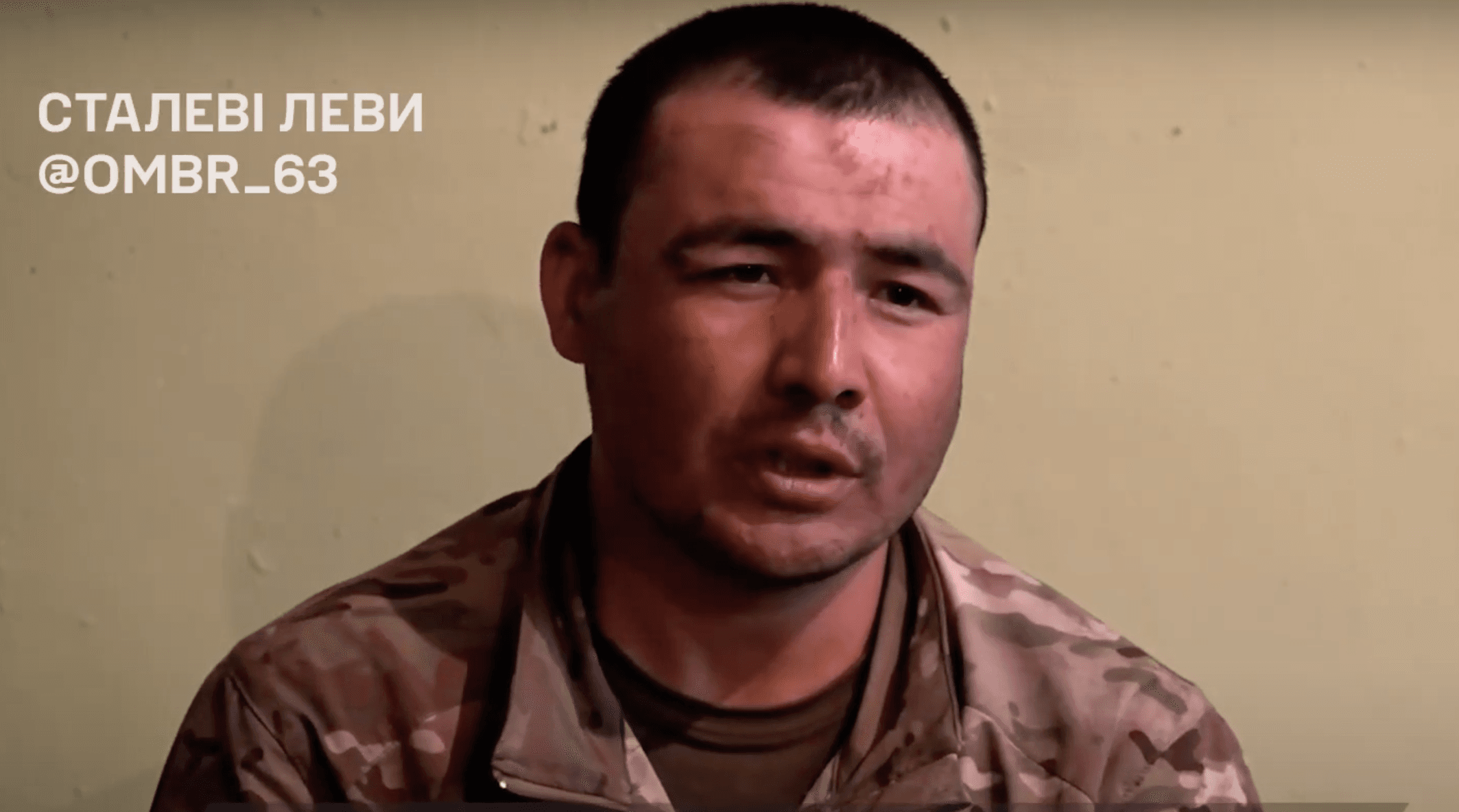
Umit, an Uzbek citizen who participated in a Russian assault on Ukrainian positions and was captured by Ukrainian soldiers of the 63rd Mechanized Brigade “Steel Lions.” (63rd Mechanized Brigade “Steel Lions” / Youtube)
The captive, identified only as Umit, revealed in an interrogation video that he agreed to serve in the Russian army in exchange for Russian citizenship and a promised reward of 2 million rubles ($25,000). He claimed he had no prior military experience and had previously worked in construction.
According to his testimony, after being recruited, he was sent directly to assault Ukrainian positions. During the battle, he was injured, became disoriented, and accidentally approached Ukrainian positions, where he was captured.
Russia has extensively recruited foreigners and migrants to fight in Ukraine, with citizens from countries across Asia, Africa, Latin America, and elsewhere ending up in Ukrainian captivity. Ukraine’s military previously captured Chinese nationals fighting for Russia, while North Korea recently confirmed it had sent troops to fight alongside Russian forces in Kursk Oblast.
The Dnipro Approach: Russia Pushes Toward New Oblast Borders
Russian forces are intensifying their offensive in southern Ukraine in a bid to breach the administrative border of Dnipropetrovsk Oblast, Ukraine’s Southern Defense Forces spokesperson Vladyslav Voloshyn reported.
“They are trying to break through toward the administrative border of Donetsk, Zaporizhzhia, and Dnipropetrovsk oblasts,” Voloshyn explained, describing the Novopavlivka direction as the “most mobile area” on the southern front. Four Russian regiments have concentrated assault units in the area, conducting 24 combat engagements in a single day.
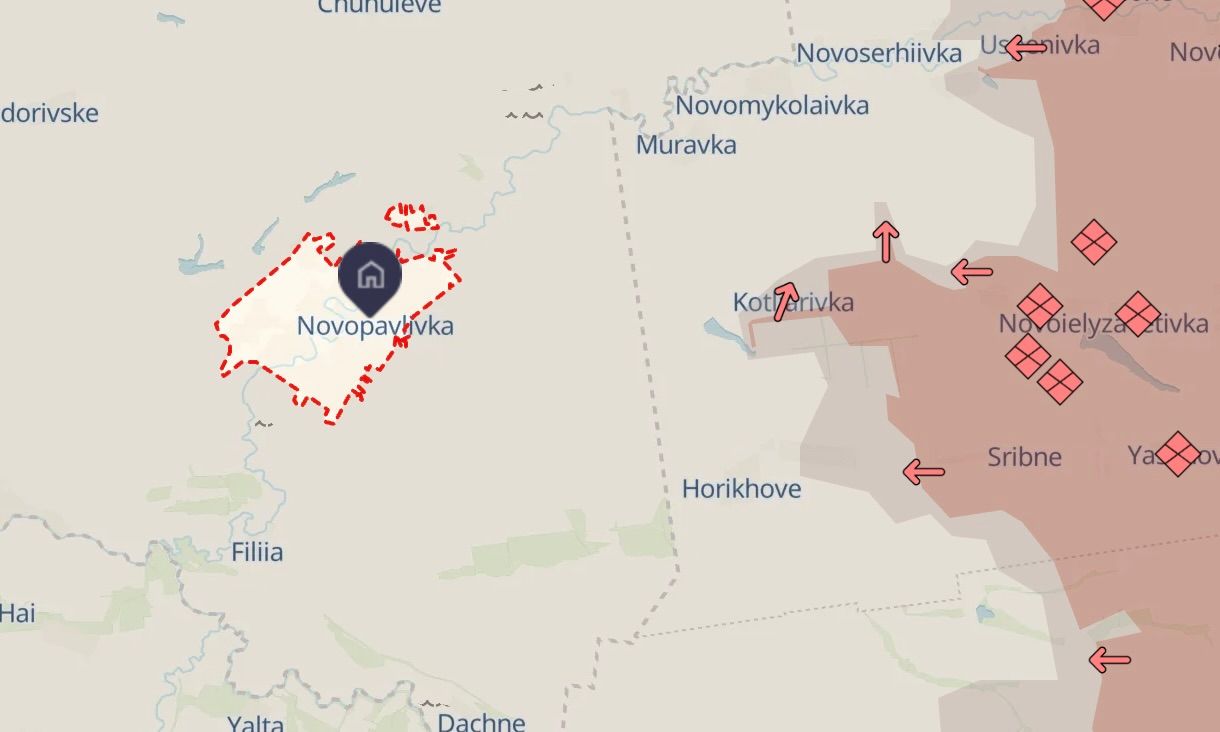
The estimated Russian advance in the Novopavlivka sector in Dnipropetrovsk Oblast, Ukrain. A black symbol marks Novopavlivka. (DeepState / OpenStreetMaps)
The Russian push prompted Ukrainian authorities on April 28 to begin mandatory evacuations of families with children from four frontline villages: Kolona Mezhova, Novopidhorodne, Raipole, and Sukhareva Balka. These settlements lie just 5-15 kilometers from Russian positions.
Although Russian troops have not yet entered Dnipropetrovsk Oblast—a major industrial and logistical hub vital to Ukraine’s war effort—the region continues to suffer regular missile, drone, and airstrike attacks that have killed civilians and damaged critical infrastructure.
Budapest’s Accusations: Orban Claims Ukrainian Interference
Hungarian Prime Minister Viktor Orban escalated tensions with Ukraine on May 13, accusing Kyiv of meddling in Hungary’s internal affairs and collaborating with an opposition party. “Ukraine has initiated a coordinated campaign to vilify Hungary in order to undermine our initiative to hold a poll on Kyiv’s EU membership,” Orban declared after a meeting of the Hungarian Defense Council.
The accusations came just days after Ukraine’s Security Service claimed it had exposed a Hungarian espionage network in western Ukraine and detained two agents. In response, Hungary expelled two Ukrainian diplomats, prompting reciprocal expulsions by Kyiv.
Orban further alleged that “the Hungarian opposition party took an active part in the special operation of the Ukrainian secret service,” likely referring to the Tisza party led by opposition figure Peter Magyar, who visited Kyiv in July 2024 and pledged to “end Hungary’s isolation from the West” if elected.
The Hungarian leader confirmed his country would proceed with a national consultation on Ukraine’s EU membership bid, emphasizing that “neither Brussels nor Kyiv can decide instead of the Hungarian people.” As a member state, Hungary holds veto power over each phase of Ukraine’s EU accession process, which formally began in June 2024.
Disconnected City: Lysychansk Cut Off From Communication
Residents of Russian-occupied Lysychansk in Luhansk Oblast remain without mobile communication or internet access, Oleksiy Kharchenko, head of the Luhansk Regional Military Administration, reported on May 13.
“Mobile communication and Internet services in the city remain down. Residents can only contact emergency services via payphones or in person. Wired communication with the outside world, including neighboring cities, is impossible,” Kharchenko wrote on Telegram.
Beyond communication blackouts, Lysychansk residents face dire conditions with critical shortages of basic utility services. Many remain uncertain about preparing for the upcoming winter, highlighting the deteriorating humanitarian situation in territories under Russian occupation.
The information blackout serves multiple strategic purposes for Russian occupying forces, preventing residents from receiving updates about Ukrainian advances, limiting their ability to report Russian military positions, and isolating them from contact with relatives in Ukrainian-controlled territory.
Inflation’s Grip: Ukraine’s Economy Faces Rising Prices
Inflation in Ukraine reached 15.1% year-over-year in April, up from 14.6% in March, according to data published by the State Statistics Service on May 13. Core inflation also rose by 0.4% in April compared to March, increasing by a total of 3.9% since the beginning of the year.
The statistics revealed sharp price increases across essential categories. Food and non-alcoholic beverages climbed by 1.8% compared to March and by 19.8% compared to April 2024. Fruit prices saw the largest monthly jump—7.9% in April and a staggering 25.3% increase over the past year.
Price hikes affected staple foods including poultry, sugar, beef, fish products, bread, pork fat, pasta, and vegetables, with increases ranging from 0.2% to 2.5%. Alcohol and tobacco prices rose 1.3% in April, partly due to increased excise taxes aligned with EU accession requirements.
Most dramatic was the 63.6% year-over-year increase in electricity prices for Ukrainians, reflecting the severe impact of Russian attacks on the country’s energy infrastructure. Only clothing and footwear offered some relief, becoming 4.4% cheaper compared to last year.
The Rolling Reinforcements: U.S. Veteran Delivers ‘Broe Trucks’ to Ukrainian Forces
Jake Broe, a U.S. Air Force veteran and popular online commentator, announced the delivery of 16 more vehicles—dubbed “Broe Trucks”—to Ukraine on May 13, part of the ongoing INVICTUS fundraiser led by the 69th Sniffing Brigade charity fund.
“The next 16 Broe Trucks have been delivered to Ukraine from our INVICTUS fundraiser!” Broe announced on social media, sharing behind-the-scenes video of the delivery provided by Alex, a representative of the 69th Sniffing Brigade.
The footage showcased various vehicles including an evacuation truck and an ambulance, which Alex explained would support Ukraine’s electronic warfare teams, SSO Rangers, and Marines. “So yeah, there’s already 116 trucks delivered,” he noted. “Your donations keep arriving.”
The 69th Sniffing Brigade, based in Estonia, specializes in refurbishing vehicles for Ukrainian defenders, outfitting them with essential equipment including night vision devices, electronic warfare jammers, new tires, and other critical upgrades. Since Russia’s full-scale invasion began, the organization has delivered more than €7 million ($7.8 million) in aid to Ukrainian units.
Looking Ahead: The Istanbul Equation
As the clock ticks toward Thursday’s potential meeting in Istanbul, all eyes remain fixed on the Kremlin for any indication of Putin’s intentions. Zelensky’s commitment to attend—with or without Putin—has created a diplomatic trap for the Russian leader, who must now either engage directly or risk being blamed for sabotaging peace efforts.
With high-level delegations from the United States and European Union preparing to witness the talks, and the threat of punishing new sanctions looming over Russia’s economy, the stakes have never been higher. Yet even as this diplomatic drama unfolds, the harsh reality of war continues to shape daily life across Ukraine, with Russian forces pressing forward on multiple fronts and civilian infrastructure remaining under constant bombardment.
Whether Istanbul becomes the site of genuine breakthrough or merely another chapter in this bitter conflict remains to be seen. But one certainty emerges: the coming days will be pivotal in determining whether this war moves toward resolution or stretches indefinitely into an uncertain future, with profound consequences for Ukraine, Russia, and the broader international order.
